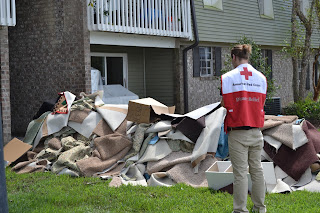Following a tornado early Friday morning, American Red Cross disaster relief team was immediately on the scene assisting families on Johns Island.

Red Cross Volunteer John Perry, pictured to the left, described the scene as a “battle zone” and said, “We are proud of the generosity that we’ve seen— we’ve had such a good turn out from our community.”
Red Cross volunteers provided meals and emergency assistance to families at a Reception Center at St. Johns Fire District Headquarters, as well as providing snacks and water to disaster responders.

So far, 39 homes have been affected, 4 of which were destroyed. Red Cross workers have assisted 23 people and are standing by to assist more families as needed.
Help people affected by disasters like tornadoes, floods and countless other crises by making a gift to American Red Cross Disaster Relief. Your gift enables the Red Cross to prepare for, respond to and help people recover from disasters big and small. Visit www.redcross.org/donate or call 843-764-2323. Contributions may also be sent to the Lowcountry SC Chapter of the Red Cross at 2424 City Hall Lane, North Charleston, SC, 29406.






